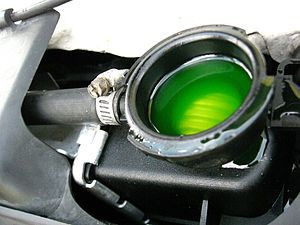Ana Maria Gonzalez-Angulo, Houston Doctor, Accused Of Poisoning Boyfriend’s Coffee; The Dangers Of Ethylene Glycol Poisoning

Ana Maria Gonzalez-Angulo, a breast cancer oncologist at the University of Texas M.D. Anderson Cancer Center, has been charged with a felony for the attempted poisoning of her colleague Dr. George Blumenschein, a specialist in lung and head and neck cancers with whom she was said to be "romantically involved."
"Dr. Ana Maria Gonzalez-Angulo is on paid administrative leave from The University of Texas MD Anderson Cancer Center. MD Anderson declines further comment," said a representative of the Houston area hospital via a statement.
Gonzalez-Angulo is currently awaiting arraignment in the Harris County Jail where she is being held on $50,000. However, her attorney Derek Hollingsworth vehemently denies his client's role in the matter:
"Dr. Gonzalez-Angulo is completely innocent. She is a distinguished citizen and scientist, and these allegations are totally inconsistent with her personal and professional life. Although I have all the respect in the world for law enforcement, it is clear to me that the University of Texas Police Department jumped the gun in this case and filed charges that should never have been filed. We now have met with the Harris County District Attorney's Office several times and we have been assured that they are going to take a fresh and careful look at this case," Hollingsworth told ABC 13 Eyewitness News.
"We will continue to completely cooperate with them. I am comfortable that ultimately, they will do the right thing. Because I want the DA's office to be able handle this case without outside media influence, I will refrain from commenting further at this time."
According to court records, Blumenschein noticed a sweetening ingredient in his coffee that he usually takes black. When he asked Gonzalez-Angulo what it could have been, she told him she had added Splenda. Roughly four hours after drinking two cups of the poison-laced beverage, the man began to experience slurred speech, blurry vision, and loss of motor skills.
When Blumenschein arrived at the hospital where he works, his colleagues diagnosed him with central nervous system depression, cardiopulmonary complications, and renal failure. A urine test and subsequent toxicology report found traces of ethylene glycol, the active ingredient in antifreeze.
Ethylene glycol poisoning, sometimes known as antifreeze poisoning, is caused by ingesting the colorless and odorless synthetic liquid used for the rapid absorption of water. According to the Centers for Disease Control and Prevention, this substance has been found in at least 37 of the 1,689 currently or previously most serious hazardous waste sites in the U.S.



























